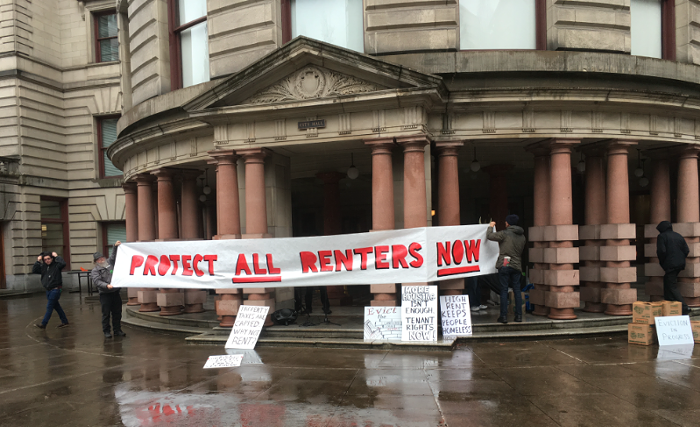
Here's what we know, heading into this afternoon's city council hearing on Portland's renter relocation law: The council plans on passing something that will enshrine the law permanently (this is the proposal that it will take up).
That means many tenants who are issued no-cause evictions, or have to move because of a rent hike of 10 percent or more, can count on between $2,900 and $4,500 to help defray moving expenses well into the future.
Here's what we don't know: When the city council will pass that permanent ordinance, and which landlords will wind up with exemptions to the law when all is said and done.
The answers to those uncertainties will unfold this afternoon, as the council embarks on a hearing that is sure to draw ire from tenants and landlords alike. The hearing is supposed to begin at 3 pm, but will likely begin later.
As we noted in this week's paper, landlords are fired up about the apparent support on City Council to require small-time landlords to pay relocation fees. Since the law was first passed last February, people who rent out a single housing unit have been able to skirt the requirements. But with three council members—Mayor Ted Wheeler, Commissioner Chloe Eudaly, and Commissioner Nick Fish—all sending a clear signal they'll support closing that loophole, that's not likely to last (Commissioner Dan Saltzman is also seen as likely to support killing the loophole). Plenty of landlords should show up today to try to change their minds.
At the same time, tenant advocates are fired up about other potential changes. They're particularly concerned about a new provision that would allow landlords to escape relocation payments when they move one of their family memebrs into the unit.
"When did this get added? Why?" tenant activist Margot Black, who helped shape the proposal as part of a volunteer "technical advisory committee," wrote to city officials earlier this week. "We never discussed this in the TAC. There are so many ways for this to be abused, especially as written, I don't even know where to start."
Black and others are also concerned by language that suggests that new fees, or hikes to utility payments, wouldn't be considered rent increases for purposes of the relocation payment law. They think that could lead to landlords levying capricious fees, and thereby creating de facto rent hikes, without having to pay the relocation money.
We wrote more about what's in the ordinance last week.
The timing of the passage of this ordinance is also a question. Some are pushing council to pass the law as an "emergency," which would mean it goes into effect immediately. That could be hard if Commissioner Amanda Fritz opposes killing the single-unit exemption, as some expect, since an emergency ordinance must be passed unanimously, with at least four votes of council. There's talk in City Hall that the council has achieved some sort of understanding among itself ahead of this afternoon's hearing, so perhaps all of this is moot.
So that's where we stand. Everyone here is expecting a long (and probably endlessly repetitive) hearing. I'll update this post with interesting bits.
3:45pm: We're finally underway here, after a hearing on maintaining affordability for the arts ran longer than scheduled. Mayor Ted Wheeler kicks it off, by thanking everyone who showed up (he's even letting some people in the balcony, which is new), and saying "it will be a long afternoon."
The mayor starts off by explaining his position on this, which has wavered in recent weeks.
"I see this as a pragmatic approach that addresses the primary issues that have been expressed through this process," Wheeler says. "I had to take time to consider recommendations from our technical advisory committee. I relied on the ideas and advice of my fellow city commissioners. I sought to understand alternative points of view. I worked hard to engage all of those who would be most impacted."
Wheeler says he believes landlords and skeptics are probably right when they claim killing the single-unit exemption will convince landlords to sell their properties. "Could this policy effect the rental landscape for landlords who have only one unit of rental housing?" he says. "On the margin, I believe it is very possible that some landlords will remove their units form the market."
But he says it comes down to the fact that "we are in a housing emergency and people are suffering." And he says: "We have to do the best we can to address the crisis that exists today in our community with the tools and the resources that we have available."
3:59 pm: Commissioner Chloe Eudaly, who first pushed the relocation law last year, is next. She recounts the situation playing out early last year, when entire buildings of tenants were being kicked out of their buildings, or facing enormous rent increases.
"We had communities begging us to help keep them together," Eudaly says. "As a renter myself, I could directly relate to what they were going through."
She says not a day goes by that her office doesn't get some call about the relocation ordinance—good or bad. "The communications that have been the most challenging are those we’ve gotten from tenants who were not covered by relocation due to the one-unit exemption. Our policy wasn’t benefitting tens of thousands of the residents that it was designed to protect."
Eudaly acknowledges that relocation payments present a hardship "for a small number" of landlords. She says she's open to creating an exemption for those hardships, though there's not a proposal on the table today.
4:07 pm: Commissioner Amanda Fritz already has an amendment. She'd like to add another exemption for landlords who give tenants a fixed-term tenancy, and tell tenants before they move in that the landlord will sell or convert the unit at a point in the future.
"This is to address one of the challenges we received in testimony," Fritz says.
I'll be curious to see if this is all Fritz needs to be okay with the ordinance. Again, there's talk of agreement between council members. The council hasn't voted on Fritz's amendment, and might not until well later.
4:14 pm: First invited testimony comes from Laura Golino de Lovato, of the NW Pilot Project. Her organization works with low-income renters, and she served on the technical advisory committee that gave input on what this law should look like. First up, she says, "I cant emphasize enough how important it’s been for our clients."
But Margot Black isn't the only one questioning the proposed exemption for landlords who move in family members. Golino de Lovato re-iterates that the advisory committee never talked about such an exemption, and says it was frustrating to see it put forward with no discussion. Things she takes issue with: "The possibility of abuse. Lack of definitions about what a family member is. Lack of definitions about timing.”
4:21 pm: Mike Nuss is a real estate investor who also served on the advisory committee. He showed up to City Council last year, as council was passing the relocation ordinance for the first time, and gave an impassioned speech that not all landlords were greedy stereotypes.
Today he says the law council is considering isn't perfect, but that it's getting there.
"There’s plenty of complaining on both sides of the table, which probably says that this is a good place to start," Nuss tells council. He also favors getting rid of the single-unit exemption, as long as the city creates a hardship waive.
"I do support this policy," Nuss says. "I think it's a bold step. I said that a year ago and I still think that today."
4:40 pm: Some interesting points, as invited testimony continues.
Christian Bryant, of the Portland Area Rental Owners Association, served on the city's advisory committee, but is also the type of person you'd expect to be on the strident side of this. He's not. In fact, while Bryant clearly communicated concerns about the relocation policy, he also acknowledged "housing issues," which he said had been brought on by supply and demand imbalance.
The relocation ordinance "does seem like our only specific tool that we have at our disposal right now to address those issues," Bryant said, adding that he doesn't think the policy should be on the books forever. He also doesn't want to do away with the single-unit exemption, but says the city should find away to assist landlords who would be put in financial jeopardy.
Then Katrina Holland, executive director of the Community Alliance of Tenants (CAT) raises a question about an exemption in the new law. It would exempt people who manage regulated affordable housing projects from having to pay relocation payments. The mayor's office has argued that affordable housing already has robust safeguards for tenants built into it. But Holland doesn't think that's the case, and Saltzman chimes in to say he doesn't get it either.
4:49 pm: By the way, a landlord group took the extraordinary step of sending out its own mailer to draw landlords to the hearing today. Here it is. Will it work? That's not clear yet. We haven't gotten to public testimony.
4:59 pm: The council hits its first snag after testimony from Christina Dirks, of Legal Aid Services of Oregon. As she did several months back, Dirks says her organization is seeing landlords skirt the relocation law by raising fees instead of rents.
"I have seen landlords issue excessive increases such as parking or pet rent," Dirks says. "Landlords are getting more than 10 percent rent increase, just in a different form."
Under the proposal before council, that would still be allowed (as I noted above). Wheeler says that was a sacrifice his office felt compelled to make. He suggests fees around parking and pets are a "choice" that tenants make.
"Their choice is get rid of their pet, get rid of their car." Eudaly shoots back. Commissioners Nick Fish and Amanda Fritz are concerned as well, but there's concern about lumping utility costs into what counts as rent hikes.
Dirks suggests taking utility fees out of the equation. "You could speak to associate housing costs controlled by the landlords," she says, adding that landlords "can raise the associated housing costs so much that you force someone to move out without relocation. That person moves out and you can raise the rent as much as you want. It is a big loophole that we’re seeing being taken advantage of."
We still aren't to public testimony.
5:20 pm: More confusion. Saltzman wants to do away with the exemption on affordable housing. Others are interested, but Wheeler wants to keep it. Shannon Callahan, interim director of the Portland Housing Bureau, says the city thinks the exemption isn't necessary, but that affordable housing providers are extremely concerned about the relocation law.
Saltzman puts forward an ordinance to strip the exemption. The plan, as of now, is to vote on the ordinance next week, adding an emergency exemption so it takes effect immediately.
It's 5:20 and we're finally on to public input. Fifty-four people have signed up. They get two minutes apiece.
6 pm: So either the landlord mailer was a dud, or they just got here late and are far down the testimony list. Whatever the case, the testimony this first 40 minutes has heavily favored supporters of the proposal before council—on the part of landlords and tenants a like. True, one small time landlord railed against the council for the policy, but in almost every case, people are for it.
There's been some spirited speech, but by far the most passionate oratory we've heard today came from Wheeler. As part of her testimony, city council candidate Jo Ann Hardesty commended the mayor for changing his position on the single-unit exemption (first he was against, then he was for).
"I want to personally thank you," Hardesty said. "It's never too late to do the right thing, especially if it’s for the right reason."
Hardesty had two minutes to make her statement. Wheeler took well more than that responding. He conjured a rhetorical medical student, who wants only to "make people better." This hypothetical student gets a patient, diagnoses their malady, and sets a treatment plan.
"Over a period of days, weeks, or longer they get more information," Wheeler said. "They read journals. They hear about research. They talk to colleagues... They come back to the patient and say, 'You know what, I just learned a few things... I’m going to change either your diagnoses or change the prescription.' Why don't we call that person a flip-flopper? We call that person a good doctor."
He kept going, saying, "Throughout this process my values have remained rock solid... This idea that in the public sphere there is no room for movement is part of the problem were experiencing in Washington."
Here's that:
6:30 pm: Oh, nevermind. Landlords showed up.
"I am no longer taking chances on marginally qualified applicants" because of the relocation law, says a landlord whose name I believe was Marie. "Before, I knew a third of people I took chances on I’d be giving them a no-cause. Since this went into effect I’ve been raising rents I wouldn’t normally raise."
Another woman named Estelle speaks of "stinker" tenants who create problems and need to be evicted. "Sometimes I get a stinker an it’s just time to move on."
Another woman who rents out a property says: "Why would I continue operating in an area where there are unnecessary risks piled on by local government? I’m beginning to think that I don't [want to]."
Meanwhile, tenant activists are playing "Landlord Excuse Bingo."
Jamie Partridge believes he got a Bingo. I'm not completely certain he's right. pic.twitter.com/GuSM1AqYZn
— Dirk VanderHart (@dirquez) March 1, 2018
6:55 pm: This baby is winding down. As I type, the last three people are testifying. Nick Fish and Dan Saltzman are gone (Fish to represent the city at some event, Saltzman... somewhere else).
And as often happens in big hearings like this, the ending will be pretty unsatisfying. This was merely a first reading of an ordinance, meaning the council will take it up again next week. At that hearing, expect commissioners to take up amendments—over Saltzman's qualms over exempting affordable housing from the law, and Fritz's proposal to include a new exemption—and for the council to weigh whether landlords are able to raise fees without triggering relocation payments.
It also sounds like council will see if there's support for putting an "emergency" clause on the law, meaning it could go into effect next week. Single-unit landlords the city over are preparing their 10 percent rent increases as we speak. Probably.


















